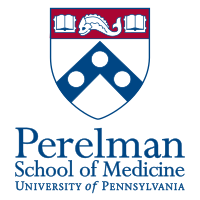University of Pennsylvania Medical School

Medical and research facilities of the Penn Medicine and the Children's Hospital of Philadelphia
|
|
|
Other name
|
Penn Med |
|---|---|
| Type | Private medical school |
| Established | 1765 |
|
Parent institution
|
University of Pennsylvania |
| Affiliation | University of Pennsylvania Health System |
| President | Amy Gutmann |
| Provost | Vincent Price |
| Dean | J. Larry Jameson |
| Executive Vice Dean | Jonathan Epstein |
|
Academic staff
|
2,100 (full-time) 1,200 (residents and fellows) |
|
Administrative staff
|
3,334 |
| Students | 775 M.D. students 594 Ph.D. students 186 M.D.-Ph.D. students 329 masters students 704 post-doctoral fellows |
| Address |
3400 Civic Center Boulevard, Philadelphia, PA, 19104, US 39°56′51″N 75°11′32″W / 39.947454°N 75.192356°WCoordinates: 39°56′51″N 75°11′32″W / 39.947454°N 75.192356°W |
| Campus | Urban |
 |
|
The Perelman School of Medicine, commonly known as Penn Med, is the medical school of the University of Pennsylvania. It is located in the University City section of Philadelphia. Founded in 1765, the Perelman School of Medicine is the oldest medical school in the United States. Today, it is a major center of biomedical research and education, and it is widely regarded as one of the country's top medical schools. Penn Med consistently ranks among the highest recipients of NIH research awards, and is ranked 5th on U.S. News & World Report 's "Best Medical Schools: Research" list.
The school of medicine was founded by Dr. John Morgan, a graduate of the College of Philadelphia (A.B. 1757) and the University of Edinburgh Medical School (M.D. 1763). In 1765, after training in Edinburgh and other European cities, Dr. Morgan returned to Philadelphia. With fellow University of Edinburgh Medical School graduate Dr. William Shippen Jr., Morgan persuaded the Trustees of the University of Pennsylvania to found the first medical school in the Original Thirteen Colonies. Only months before the medical school was created, Morgan delivered an address to the Trustees and the citizens of Philadelphia, "Upon the Institution of Medical Schools in America" during which he expressed his desire for the new medical school to become a model institution:
Perhaps this medical institution, the first of its kind in America, though small in its beginning, may receive a constant increase of strength, and annually exert new vigor. It may collect a number of young persons of more ordinary abilities, and so improve their knowledge as to spread its reputation to different parts. By sending these abroad duly qualified, or by exciting an emulation amongst men of parts and literature, it may give birth to other useful institutions of a similar nature, or occasional rise, by its example to numerous societies of different kinds, calculated to spread the light of knowledge through the whole American continent, wherever inhabited.
...
Wikipedia
